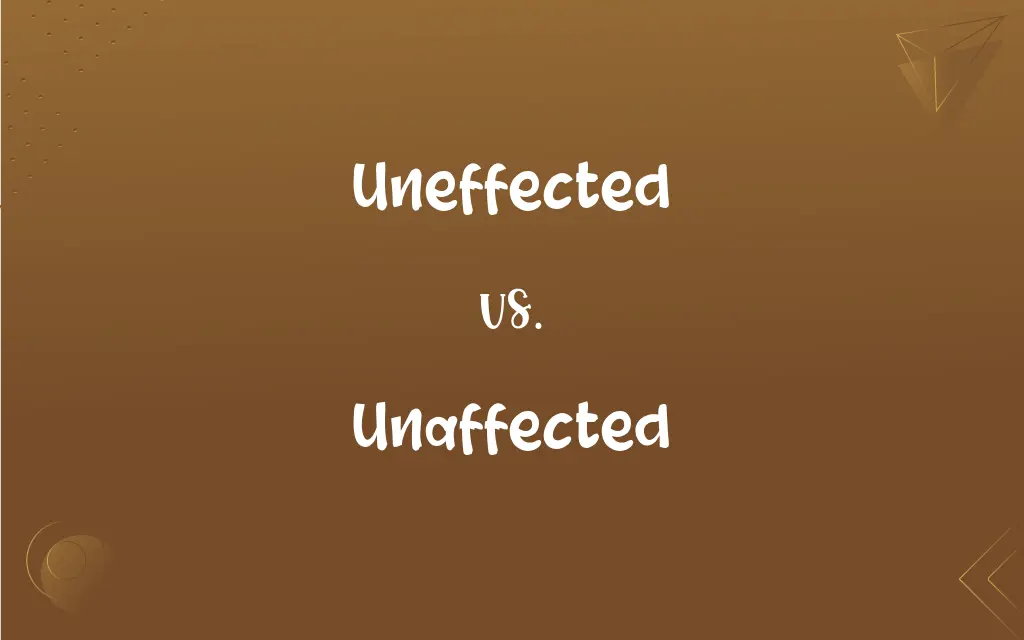Uneffected vs. Unaffected: What's the Difference?
By Harlon Moss & Janet White || Updated on May 24, 2024
"Uneffected" means not caused or brought about, while "unaffected" means not influenced or changed by something.

Key Differences
"Uneffected" is a less common term indicating something that has not been caused or brought into existence. It is rarely used in modern English. "Unaffected," on the other hand, means not influenced or altered by an external factor, indicating that something remains in its original state despite potential influences.
"Uneffected" relates to causality and creation, implying that an action or event has not occurred. "Unaffected" pertains to the state of being, indicating that a person, object, or situation remains unchanged despite circumstances that could have caused an impact.
In usage, "unaffected" is far more prevalent, often describing people who remain unpretentious or situations that are not impacted by external changes. "Uneffected" is typically used in very specific or formal contexts, if at all, to denote the absence of an effect or result.
Understanding the difference helps in choosing the correct word: "unaffected" for scenarios involving influence or change, and "uneffected" (though rarely) for situations involving causality and occurrence.
Comparison Chart
Definition
Not caused or brought about
Not influenced or changed by something
ADVERTISEMENT
Usage Frequency
Rarely used
Commonly used
Context
Causality and creation
State of being and influence
Implication
Absence of an effect or result
Remaining unchanged or unaltered
Example Use
Specific, formal contexts
Everyday language to describe lack of influence
Uneffected and Unaffected Definitions
Uneffected
Not caused or produced.
The policy changes remain uneffected due to lack of consensus.
ADVERTISEMENT
Unaffected
Not altered or impacted.
Their friendship was unaffected by the long distance.
Uneffected
No effect taking place.
The intended reforms were left uneffected.
Unaffected
Not influenced by external factors.
She remained unaffected by the criticism.
Uneffected
Not brought into existence.
The proposed measures were uneffected in the final plan.
Unaffected
Unchanged despite circumstances.
The landscape was unaffected by the storm.
Uneffected
Without any resultant action or consequence.
His efforts were uneffected by the absence of necessary resources.
Unaffected
Remaining in its original state.
His calm demeanor was unaffected by the chaos around him.
Uneffected
Without any creation or initiation.
The new protocol was uneffected due to budget constraints.
Unaffected
Genuine and unpretentious.
Despite his fame, he stayed unaffected and humble.
Uneffected
Not effected; not put into practice.
Unaffected
Not changed, modified, or affected.
Unaffected
Marked by lack of affectation; unpretentious or sincere.
Unaffected
Not affected or changed.
Since I work from home, I was unaffected by the office move.
Unaffected
Lacking pretense or affectation; natural.
Unaffected
Someone not affected, as by a disease.
Unaffected
Simple past tense and past participle of unaffect
Unaffected
Not affected or moved; destitute of affection or emotion; uninfluenced.
A poor, cold, unspirited, unmannered,Unhonest, unaffected, undone fool.
Unaffected
Free from affectation; plain; simple; natural; real; sincere; genuine; as, unaffected sorrow.
Unaffected
Undergoing no change when acted upon;
Entirely unaffected by each other's writings
Fibers remained apparently unaffected by the treatment
Unaffected
(followed by `to' or `by') unaware of or indifferent to;
Insensible to the suffering around him
Unaffected
Free of artificiality; sincere and genuine;
An unaffected grace
Unaffected
Not touched emotionally;
Was left untouched by the music
FAQs
Is "uneffected" commonly used?
No, "uneffected" is rarely used in modern English.
What does "unaffected" mean?
"Unaffected" means not influenced or changed by something.
Can "uneffected" and "unaffected" be used interchangeably?
No, they have different meanings and are used in different contexts.
What is an example of "uneffected"?
e.g., The proposed changes remain uneffected due to lack of agreement.
What is an example of "unaffected"?
e.g., She remained unaffected by the negative comments.
Does "unaffected" relate to change?
Yes, "unaffected" means not altered or impacted by external factors.
What does "uneffected" mean?
"Uneffected" means not caused or brought about.
Does "uneffected" imply causality?
Yes, "uneffected" implies that an action or event has not occurred.
Can a person be "unaffected"?
Yes, a person can be described as "unaffected" if they are not influenced by external factors.
What part of speech is "unaffected"?
"Unaffected" is an adjective.
When should I use "unaffected"?
Use "unaffected" to describe something that remains unchanged despite potential influences.
Why is "unaffected" more common?
"Unaffected" is more commonly used because it describes everyday situations where things remain unchanged.
What part of speech is "uneffected"?
"Uneffected" is an adjective.
Are there synonyms for "unaffected"?
Synonyms for "unaffected" include "unchanged," "untouched," and "unaltered."
Is "uneffected" used in formal writing?
"Uneffected" may be used in very specific or formal contexts, though it is uncommon.
Can "unaffected" refer to physical objects?
Yes, physical objects can be described as "unaffected" if they remain unchanged.
Are there synonyms for "uneffected"?
Synonyms might include "uninitiated" or "unrealized," though they are not exact equivalents.
Can "unaffected" describe emotions?
Yes, "unaffected" can describe someone whose emotions are not influenced by external factors.
Is "uneffected" related to effectiveness?
No, "uneffected" is not related to effectiveness; it means not caused or brought about.
Does "unaffected" imply stability?
Yes, "unaffected" implies stability and lack of change.
About Author
Written by
Harlon MossHarlon is a seasoned quality moderator and accomplished content writer for Difference Wiki. An alumnus of the prestigious University of California, he earned his degree in Computer Science. Leveraging his academic background, Harlon brings a meticulous and informed perspective to his work, ensuring content accuracy and excellence.
Co-written by
Janet WhiteJanet White has been an esteemed writer and blogger for Difference Wiki. Holding a Master's degree in Science and Medical Journalism from the prestigious Boston University, she has consistently demonstrated her expertise and passion for her field. When she's not immersed in her work, Janet relishes her time exercising, delving into a good book, and cherishing moments with friends and family.































































